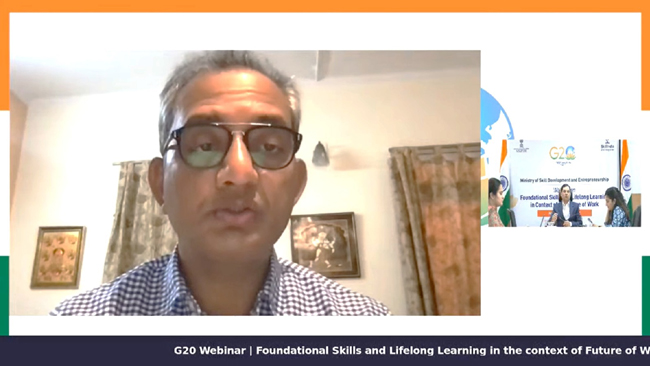
New
Delhi, March 2023.
As
a precursor to the upcoming third G20 Education Working Group meeting scheduled
in Bhubaneswar, the Ministry of Skill Development & Entrepreneurship (MSDE)
organised the 2nd webinar on the topic ‘Foundational skills and lifelong
learning in the context of future of work. The webinar was attended by an
esteemed panel including Shri Atul Kumar Tiwari, Secretary, MSDE;Shri Sanjay
Kumar, Secretary, Department of School Education and Literacy, Shri Nirmaljit
Singh Kalsi, Chairperson, National Council for Vocational Education and
Training (NCVET), Dr Krishna Kumar Dwivedi, Joint Secretary,MSDE; and Dr. Maneesh
Mishra, Executive Vice President- Strategy, NSDCalong with key stakeholders in
the skill ecosystem and industry experts.
With
the rise of automation across industries, it is imperative to mainstream
foundational skills into the curriculum framework to effectively measure the
learning outcomes. The webinar offereda unique platform to discuss how to
increase the capacity of the youth and promote lifelong learning by pivoting on
disruptive technology so that they can adapt to the ever-evolving future of
work.
Sharing
his views, Shri Atul Kumar Tiwari, Secretary, MSDE said, the rapidly
evolving world demands more than knowledge acquisition, students must develop
the ability to learn how to learn to navigate the challenges of the future of
work and embrace the real-world situation. The education system should
prioritize the development of foundational skills, as well as higher-order
cognitive abilities such as problem-solving and critical thinking, to enable
students to succeed academically and ultimately improve their quality of life.
Therefore, education stakeholders must collaborate and focus on strengthening
foundational learning to ensure that students are equipped with the necessities
for the future. This can be achieved through the integration of technology and
blended learning, as well as the development of robust monitoring and
evaluation mechanisms to track learning outcomes. The future of work emphasizes
the need for formal recognition of universal entitlement of learning and
establishment of effective lifelong learning ecosystem.
The
webinar brought together industry leaders, academicians, and organizations to
discuss the significance of foundational skills among school-age learners as
well as them adapting to ‘learn to learn learning’ to develop solutions for
ongoing global challenges, climate change being on priority. Eminent speakers
from Department of School Education & Literacy, Ministry of Education (MoE),
NCVET and global organisations, Asian Development Bank, and OECD shared their
views on early identification of skills and the role the government and the private
sector can play in providing foundational skills.
During the first session – Shaping the future workforce with skills to
succeed – the experts deliberated on how the G20 countries can come
together to help people realise their full potential. This is also critical as globalisation,
new technologies, migration, and changes in the labour market alterthe World of
Work. All the speakers agreed that there is an urgent need to make relevant
skills like scientific temperament, creativity, communication, and
problem-solving a part of the curriculum
which some of the stakeholders are developing. Education also needs to be made a
continuous process, with opportunities for learning and upskilling throughout
an individual’s life.
Speaking
on the occasion, Dr
Krishna Kumar Dwivedi, Joint Secretary, MSDE said, “The rapid
proliferation of emerging technologies is fundamentally transforming the way we
work and with this, predicting the future of work trends has become an
increasingly complex and challenging task. With the potential of these
technologies to replace humans in certain roles, it is significant that we
adapt swiftly to the changing market needs. The role of ChatGPT is expanding in
the workplace and its capabilities suggest that it may replace up to 20 human
job roles soon. With aforesaid, coordinated
efforts are required to develop a vibrant ecosystem to address the challenges
of future of work”.
Shri
Sanjay Kumar, Secretary, Department of School Education & Literacy,
Ministry of Education, said, “The Hon’ble Prime
Minister Narendra Modi once quoted that the greatest challenges that the
greatest challenges the world face today can only be solved by acting together,
and amongst the various skills that we talk about, collaboration happens to be
one of the prominent ones. We live in a world where globalization, new
technologies, migration, changing labour markets, and environmental &
political challenges
Additionally,
the discussion shed light on how the government, academia and the industry are
working to establish a system to deliver foundational skills and facilitating
dynamic learning over the life cycle to ensure people keep pace with the
current trends. They also acknowledged the positive role that National
Education Policy (NEP) 2020 and the National Skills Qualification Framework
(NSQF) have been playing in augmenting foundational skills.
In
the second session – Transitioning from Recognition of Prior Learning (RPL)
to Recognition of Continuous Learning (RCL) – the discussion centred around
how this shift is critical for the G20 nations especially as they are
witnessing a paradigm shift in the composition of employment, marked by the
advent of new jobs requiring high-level cognition and socio-emotional
skills. The panellists reiterated the need to deliberate on how the future of
work is changing and to make the most from the emerging opportunitiesand making
all learning subjected to assessment. This will remove any ambiguity and
establish academic equivalence between vocational education and general
education, enabling mobility and promoting prior, and continuous learning.
Going
forward, lifelong learning will also need to rest on four pillars – learning to
be, learning to know, learning to do, and learning to live together. These are
also critical as India looks forward to establishing a skill-based learning
structure, complementing knowledge-based learning among students. This will
also help the nation to rethink lifelong learning in the context of the ongoing
changes and building a robust digital infrastructure that will contribute to
making a future-ready workforce.
Overall,
the webinar focused on identifying policies and practices across multiple
themes to strengthen teaching and learning methods, contents, curricula, and
assessment frameworks, making education more relevant in the aspect of capacities
and skills required in G20 nations.